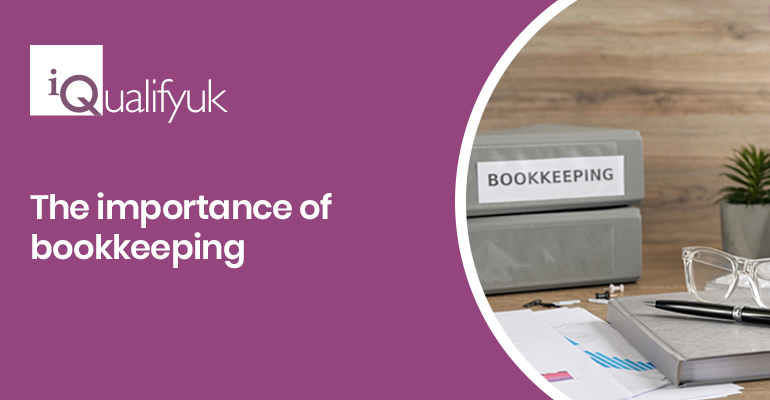The importance of bookkeeping
September 7, 2023 2023-09-07 13:13The importance of bookkeeping
The main reason why bookkeeping is such a lucrative career is because every business, no matter how big or small, needs to have a bookkeeper to ensure their finances are in order at all times. Poor bookkeeping can be mayhem for a business, which is why a qualification from the International Association of Bookkeepers (IAB) will make you an incredibly appealing candidate to businesses in need of a skilled bookkeeper. Here are 5 crucial purposes of business bookkeeping which highlight the importance of bookkeeping.
1. To fulfill tax obligations
Bookkeeping ensures that all important financial documents, incomings and outgoings are thoroughly recorded in order to pay corporate tax. Without appropriate bookkeeping throughout the financial year, it can be incredibly difficult to file an accurate tax return. Incorrect returns could mean the business overpays, which could put pressure on their cash flow, or underpays, which could result in extra demands for payments with interest. Furthermore, VAT-registered businesses have to submit a VAT return every few months detailing VAT charged and paid; bookkeeping is essential to keep up with these requirements.
2. To fulfil legal obligations
It’s not enough for businesses to simply submit tax returns and VAT returns; they must also maintain business records in order that HMRC can audit their finances at any point they wish. This is to ensure that the business is paying adequate tax, wages and National Insurance contributions. It is the bookkeeper’s job to ensure all these records are kept up to date, with every important transaction appropriately recorded to prevent any discrepancies with previously submitted tax returns.
3. For better analysis and management of business finances
Bookkeeping isn’t just about maintaining financial records; it’s about analysing them too. Every business needs to maintain a healthy cash flow in order to continue to pay staff and suppliers. Failing to do so could prevent the business from functioning as normal, which could lead to lost business and, in extreme cases, liquidation of the company. As bookkeeper it is your job to continuously analyse the business finances to ensure that cash flow is healthy and the business can remain strong.
4. To help plan business strategies
A bookkeeper’s analysis of business finances will help to guide the overall business strategy, giving sage advice to business owners. Plans to expand, invest and budget will all be influenced by the existing financial records, and as a bookkeeper you may be asked for recommendations on a regular basis. Business planning simply cannot be done successfully without looking over financial records, so bookkeeping is an important part of business expansion.
5. Reporting to investors
Many businesses rely heavily on investors to help their business grow and become successful, but these investors need to know that their money is in the right place. Thorough bookkeeping ensures that investors can access detailed reports about the company’s financial status in order that they can feel confident in their investment. Furthermore, when approaching potential new investors the business will be expected to provide financial data in order to demonstrate that it is in good standing; as such, good bookkeeping can help to secure new investors.
Recent Posts
- iQualify UK is excited to announce our recent accreditation with Pearson
- iQualify UK honoured with Queen’s Award for Enterprise: International Trade
- How is Leadership Related to Management in a Contemporary Business Environment?
- How Do Barriers to Change Influence Leadership Decision-Making?
- How Does Change Impact on an Organisation’s Strategy and Operations?



